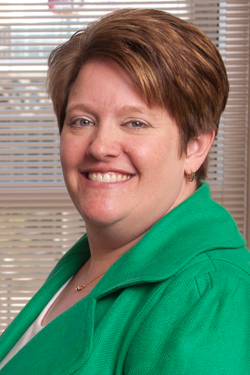Dr. Swann Arp Adams has been named one of the University of South Carolina's "Rising Stars."
June 21, 2011

Dr. Swann Arp Adams, an Arnold School faculty member and alumna, is seeking to eliminate health disparities in breast cancer.
Dr. Swann Arp Adams has been named one of the University of South Carolina's "Rising Stars."
An article about her research to eliminate health disparities in breast cancer is featured in the current issue of USC's Breakthrough magazine, which profiles 18 assistant and associate professors "whose scholarly pursuits, scientific inquiry, and passion for learning would make them the envy of any university's faculty."
Adams, an assistant professor who holds joint appointments in the Arnold School and the College of Nursing, is seeking to discover why African-American women in South Carolina are less likely than white women to be diagnosed with breast cancer, but more likely to die from the disease.
"A lot of research has been done on the topic, and a plethora of answers await researchers, but many barriers exist to finding them," Adams said of her epidemiological research. "Some think that African-American women schedule mammographies less often than white women and aren't as quick to seek follow-up treatment if suspicious findings are detected.
"I'm interested in how mammography might play into these disparities in breast cancer, as well as on the treatment side," Adams said. "Are African- American women getting the same types of treatments that are recommended, or different ones? Are there cultural barriers to receiving treatment or even mammography?"
Some of Adams' work has been conducted with the Best Chance Network, a national breast and cervical cancer early detection program funded by the Centers for Disease Control and Prevention.
She's also the research program director for a breast cancer prevention project with African-American women in the area around Florence, S.C. The project, funded by a $4.3 million grant from the National Cancer Institute, teaches healthy lifestyles to determine if such countermeasures can stem the incidence of breast cancer. The study monitors specific proteins in the blood that have been shown to help prevent cancer or improve prognosis if cancer is detected.
The associate director of USC's Cancer Prevention and Control Program at the Arnold School, Adams is on the faculty in the Department of Epidemiology and Biostatistics. She is an Arnold School alumna, having earned her doctoral degree in epidemiology in 2003. Adams was recognized in 2008 with the Gerry Sue Arnold Award, one of the Arnold School's top awards for alumni.
Her research has been supported by the National Institutes of Health, The Duke Endowment, the National Cancer Institute, NASA Earth Sciences, the Department of Defense, the S.C. Cancer Disparities Community Network, the S.C. Cancer Center and the American College of Sports Medicine.
Adams has served as an advisory panel member of The Witness Program, which encourages African-American women to get mammograms, and she is an active member of the S.C. Cancer Alliance, a statewide non-profit organization dedicated to reducing the impact of cancer on all South Carolinians.
Although her research is focused on African-American women because that is where she sees the greatest need, "whatever we find for African-American women will have benefits for all women," Adams said.
"There may need to be some adaptations depending on different cultural issues, but if we find something that increases the survival rate for African-American women, nine times out of 10 it will help all women survive this devastating disease, regardless of race."



_01.jpg)